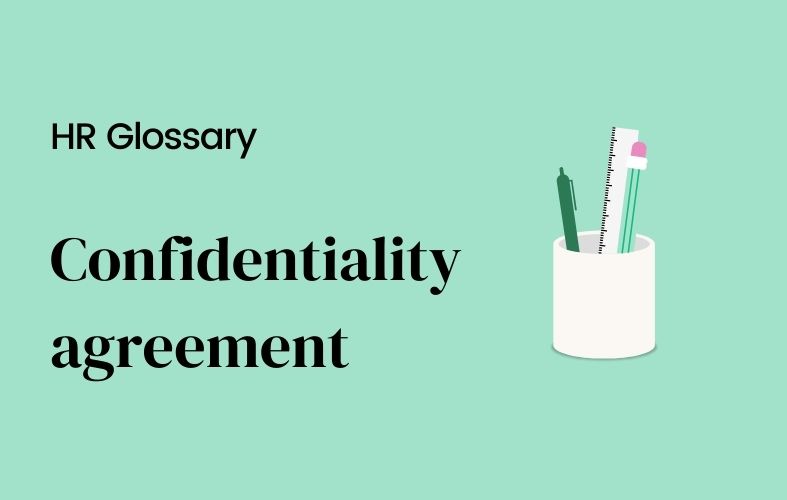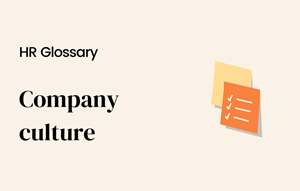Confidentiality Agreement

[Sommaire]
What is a confidentiality agreement?
A confidentiality agreement is a legal agreement that outlines confidential information that the two parties will share with one another and should not disclose to other parties. It may also be referred to as:
- A non disclosure agreement NDA
- A non-disclosure agreement
- A secrecy agreement
- A confidential disclosure agreement
- A proprietary information agreement.
They are often used by organizations that have sensitive information and intellectual property that should not be made available to competitors or the public.
It is important to remember that a confidentiality agreement template cannot prevent employees from reporting wrongdoing within your organization to the police or “whistleblowing.”
Why is it important to have employees agree to a confidentiality agreement?
It is important to get employees to agree to a confidentiality agreement because it prevents employees from revealing confidential or proprietary information. This sensitive information could include:
- Innovative ideas and future product launches
- Processes that give your organization a competitive edge
- Details of how to make unique products, such as secret recipes
- Customer or supplier information such as the prices you pay for raw materials or that you charge individual customers.
Without an employee confidentiality agreement, disgruntled employees could share private information to seek revenge.
Lower-paid workers could be bribed into sharing sensitive information. Ex-employees could use the information they have to their advantage, perhaps using it against you should they start working for a competitor or set up their own business.
When should you have employees sign a confidentiality agreement?
A confidentiality agreement is effective from the moment an employee signs it. There are three options for when you should ask an employee to sign a sample confidentiality agreement:
- When they first join your organization.
- If they move roles and join a department that has access to highly sensitive information.
- When they leave your organization, as a way of stopping them from sharing the sensitive information they hold.
You should explain the confidentiality agreement to your employees when they sign it, and once it’s signed, you should store the agreement in a safe and secure location.
Uploading a copy to your HRIS or even using an electronic version with an electronic signature will ensure it is entirely secure and easy to access for the two parties involved. You should also give your employee a copy. If you need help, you should contact a law firm.
How should you write a confidentiality agreement?
Writing a confidentiality agreement is an important process that creates a legally binding document. For this reason, it is wise to consult a lawyer to ensure you have covered all important details. Here are some other considerations:
- Detail what information is confidential. The agreement should be specific and should not include every detail about your company.
- Be clear about the information that is not confidential. For example, information that is in the public domain.
- Explain how long the agreement will stay in place. For instance, could it be for ten years after an individual’s employment termination, in perpetuity, or for a shorter length of time, such as five years?
- State what will happen if the employee breaks the agreement. Will they be sued, lose their job, or face a fine?
Make sure the agreement is signed by both parties and that each party has a copy. A Confidentiality Agreement (also called a Non-Disclosure Agreement or NDA) is a legally binding contract in which an individual or organization promises to protect certain information from being shared.
This type of agreement is typically used when one party will be sharing confidential information with another party and wants to ensure that the information remains private. Confidential information includes anything that could be considered a trade secret or could give someone an unfair competitive advantage.
There are two types of confidentiality agreements:
Mutual and one-sided:
A mutual confidentiality agreement is between two parties where both sides agree not to share the other party’s confidential information.
A one-sided confidentiality agreement :
It is between two parties where only one party (the disclosing party) agrees not to share the other party’s (the receiving party) confidential information.
What should be included in a confidentiality agreement?
The confidentiality agreement should include:
- The term “Confidential Information” defines what confidential information includes.
- The duration of the agreement: for how long the confidential information must remain confidential.
- The receiving party's obligations are related to what they cannot do with the confidential information.
- The consequences of breaching the agreement: what will happen if the receiving party breaks the confidentiality agreement.
You can also include other terms in the confidentiality agreement, such as:
- The confidentiality agreement does not prevent the receiving party from sharing information that is already known to them.
- The confidentiality agreement does not stop the receiving party from sharing information that becomes publicly known without breaching the confidentiality agreement.
- Either party can end the confidentiality agreement at any time.
Confidentiality agreements are important documents that can protect your business. Consult a lawyer to ensure you have covered all essential details and make sure both parties sign the agreement.
What are the reasons to consider using a confidentiality agreement?
As an employer, you may want to protect your business interests by having your employees sign a confidentiality agreement. This will prevent them from sharing confidential information about your company with others.
You might want to have a confidentiality agreement, such as:
-
To protect your company’s trade secrets:
Confidentiality agreements can help protect your company’s trade secrets, such as formulas, designs, processes, and strategies.
-
To prevent employees from sharing confidential information with competitors:
If you have employees who work with confidential information, you may want to have them sign a confidentiality agreement to prevent them from sharing it with your competitors.
-
To protect your customers’ information:
Suppose you have customers who share confidential information with you, such as their contact information or credit card numbers. In that case, you may want to have them sign a confidentiality agreement to protect this information from being shared with others.


